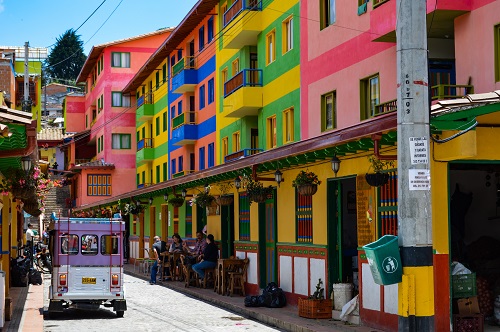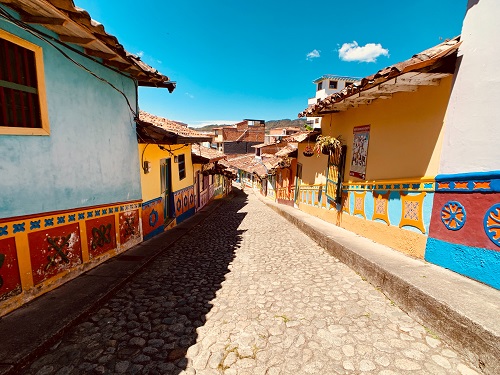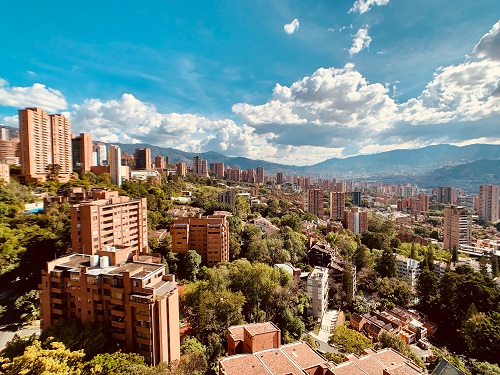Columbia’s friendly locals, beautiful Caribbean coastlines and relaxed way of life have made it an attractive expat destination in recent years. The country has previously struggled with a less-than-brilliant reputation, but now the economy is growing and crime rates are at an all time low.Renting and buying property in Colombia is relatively straightforward, and with quality of life steadily improving, and a range of amenities for foreign expats, there’s no better time to make the move.
Finding a property in Colombia
Securing a home in Colombia can be difficult if you don’t speak Spanish, and the high demand for properties means that you may need to act fast. Therefore, it’s advisable to have your preferred neighbourhood and budget in mind before you begin your search.
To find an apartment to rent, many expats choose to walk around their desired area. Look for ‘se arrienda’ signs, and contact the owners to arrange a visit. In Colombia, properties are often rented out by individuals as opposed to agencies.
There are also numerous estate agents in Colombia, but if you don’t speak Spanish, you may want to take someone with you who can translate.
Unfortunately, there is no Multiple Listing Service (MLS) in Colombia, so you’re unable to see all the properties available at once. The following agencies and websites are generally well regarded:
• Century 21 Global
• Espacio Urbano
• Encuentra 24
• John Taylor Real Estate

How much does property cost in Colombia?
The cost of property in Colombia will vary depending on your location, but Americans and Europeans often see it as very affordable. Each neighbourhood belongs to an estrato, which is scored. The higher the score, the more you’ll pay for the property, utilities and amenities. This is so those living in poorer areas don’t have to pay the same as those in wealthier neighbourhoods.
Bogota
The residents of Bogota enjoy year-round Spring-like temperatures and beautiful mountainous scenery. Prices are very reasonable and crime rates are dropping, which makes it a great place to buy or rent.
For purchase: The cheapest property in Bogota will cost you around $150,000. For a large, luxurious apartment, expect to pay up to $500,000.
For rentals: Rent is also relatively affordable compared to in many European and American cities. A basic one-bedroom flat will cost around $300 per month, while a two-bed in a higher estrato may cost up to $600.
Medellin
Once thought of as somewhere to be avoided at all costs, Medellin now has a bustling expat community. The city has a relatively low cost of living, which makes it a great place to get set up.
For purchase: Medellin has a range of homes, from small apartments priced at under $100,000 to luxury homes that cost up to $1m. The price will hugely depend on the age of the building and the neighbourhood in which you are purchasing.
For rentals: The rent you pay in Medellin could be as little as $100 per month, or as much as $600 per month. The higher the estrato, the higher the rental price.
Santa Marta
Fans of the Caribbean coast should look no further than Santa Marta. This lovely beach town is home to the world famous Parque Nacional Natural Tayrona, and the town itself is well set up for expats.
For purchase: An apartment in the city centre could cost you up to $7000 per square meter, while one outside the centre could cost you half of this.
For rentals: Rent for a large apartment will cost you between $400 and $1000 per month. The closer you are to the beach, the more you’ll pay.
Renting property in Colombia
Renting in Colombia is relatively straightforward, although there are a few things to keep in mind.
The standard notice period to end a rental lease is three months, and there is a penalty for early termination that applies to both tenants and landlords. If you breach the contract and agreed notice period, you may have to pay three months’ rent.
Deposits are technically not permitted in Colombia, so many landlords and agencies will ask for a fiador (guarantor) instead. If you don’t have a guarantor, you may need to pay a few month’s rent in advance. Pay this via an insurance company so you have some protection. Often, your employer can act as a fiador, so it is worth asking about this.
To rent in Colombia, you only need a passport and a proof of income. However, there will be a lot of paperwork to fill out. Once a property has been found and a price agreed with the landlord, a contract is set up. You may need references and background checks.
Both furnished and unfurnished houses are available, with furnished apartments being a lot more expensive. Keep in mind that unfurnished properties may lack what many see as basic amenities, such as refrigerators and washing machines.
Rental contracts usually last 12 months, although a shorter period can be negotiated with landlords.
Questions to ask include:
• Does the property operate with weekly or monthly pricing?
• When is rent due and who is it payable to?
• Does the rent include the cost of maintenance, such as cleaning or gardening?
• Who is responsible for the payment of utilities?
• What is your notice period?

Buying property in Colombia
Buying property in Colombia is relatively straightforward, with no restrictions on foreign buyers. You are able to purchase a property whether you are a full-time resident or not. In fact, all you need is a passport and sufficient funds.
Once you’ve found the property you want to buy, you will need to acquire a Certificate of Tradition and Liberty, which contains all the information about the property and its history. You should, at this stage, hire a lawyer to assist you in verifying this.
Obtaining a mortgage from a Colombian bank is difficult, and if you do manage to get one approved, you may have to pay up to 15% interest. It is even difficult for locals to get a mortgage, which is why many choose to rent rather than buy. To be considered for a mortgage, you will need residency, and you must have lived in the country for at least two years.
One option would be to arrange a private mortgage with the seller. This is possible, but not common, and you may need to pay a deposit of up to 50%.
As a buyer, you will need to pay taxes and fees. These include:
• 1% tax for registration
• 0.5% fee for registration
• 0.15% notary fee
The seller will also have taxes to pay. The previous owner should have paid all outstanding taxes before selling, and you will be able to check this by obtaining a Tax-Free Property Certificate and a Tax-Free on Value Gained Property Certificate.
The final step of purchasing property in Columbia is to sign the Public Deed, which will be produced by a notary. This will confirm that you are the legal owner.

